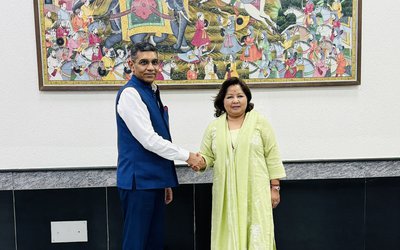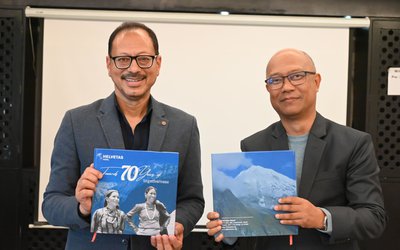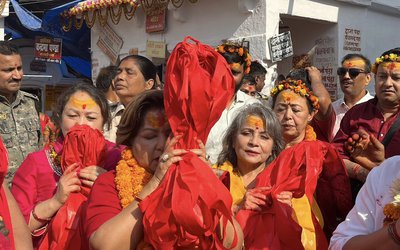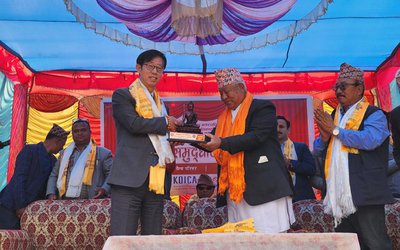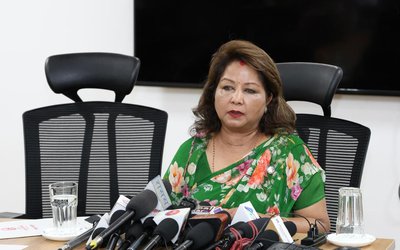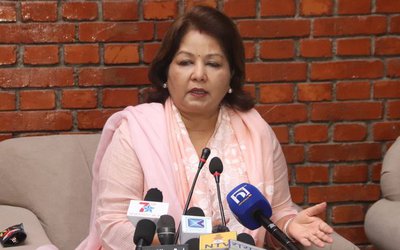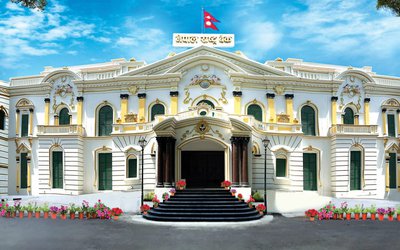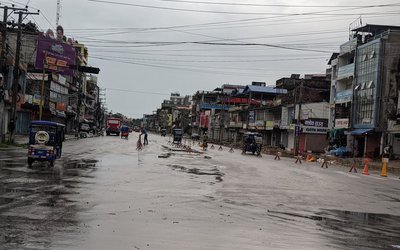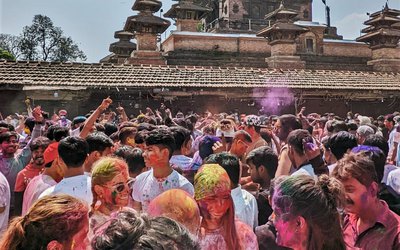
The Centenary of the Nepal-UK Friendship Treaty of 1923 was commemorated in a one-of-a-kind event held at the historic Basantapur Palace. The event featured a performance by the Nepal Army's musical band adding to its significance.

In the presence of Foreign Minister N.P. Saud, Foreign Secretary Bharat Raj Paudyal, British Ambassador to Nepal Rob Fenn, Professor Triratna Manandhar, a renowned scholar of history and joint secretary of MoFA Ganesh Dhakal as well as notable retired officials of MoFA, the Nepal government, the Nepal Army, and other scholars and diplomats based in Kathmandu, the centenary celebration held at the historic courtyard of Basantapur Palace was truly exceptional.
With Secretary Paudyal, who has been nominated as an ambassador to Canada with approval from the Parliament Hearing Committee, leading the foreign office, it is predictable why this historic venue was chosen.
As Winston Churchill once said, "The farther backward you can look, the farther forward you are likely to see." Hosting this program at the historic location, Ministry of Foreign Affairs (MoFA) demonstrates the relevance of this quote.
It gives me immense pleasure to celebrate the 100th anniversary of the UK-Nepal friendship treaty in such a stunning location. I would like to express my gratitude to the Ministry of Foreign Affairs (MOFA) for organizing this event. As per the terms of the treaty, Nepal and the UK . British ambassador to Nepal Robert Fenn expressed his anticipation for the coming century stating ,"We look forward to the next century together."
The British Embassy shared on their official X page, stating "It is a great pleasure to celebrate the centenary of the UK-Nepal friendship treaty at this beautiful location." Ambassador Fenn emphasized the treaty’s significance in strengthening bilateral relations between the two nations.
Narayan Prakash Saud, the Minister of Foreign Affairs, delivered a speech emphasizing the importance of the treaty and its positive impact on the bilateral relations between Nepal and the United Kingdom.
Foreign Minister Saud stressed the significance of a treaty that recognized Nepal's autonomy and sovereignty, believing it will enhance Nepal's global role. Minister Saud stated, "This treaty is crucial for Nepal's past, present, and future."
The treaty includes a provision that ensures perpetual peace and amity between Nepal and the United Kingdom. British ambassador Fenn expressed anticipation for the future century of cooperation between the two countries.
The program's keynote speaker, historian Prof. Dr. Tri Ratna Manandhar, delivered a comprehensive discourse on the treaty, emphasizing its context and sequences.

According to Professor Manandhar, Prime Minister Chandra Sumsher played a crucial role in convincing the British government that recognizing of Nepal's independence would strengthen relations.
In his keynote speech, Historian Professor Dr. Manandhar recounted a series of historical events that occurred in the Indian subcontinent. He also discussed Nepal's backing of the United Kingdom after the signing of the 1816 Sugauli Treaty.
What British Prime Minister Churchill said was not a statement, it was indeed accurate. Studying history can provide valuable insights into the era in which one lives. Not only does it offer predictive powers for the future, but it also provides insight into potential future occurrences.
The speakers explained the treaty's purpose within the current context. However, due to the vast differences between the past and present, we can gain valuable insights into the arbitrary nature of our current way of life.
The past, as some say, differs vastly from the present. Those who cannot experience new cultures through travel can gain a similar level of education by studying history and observing how differently things were done in the past. The context and language of the 1923 treaty between Nepal and the United Kingdom are exceptionally distinct. The treaty was established after the conclusion of World War I and emphasized equality, independence, and the sovereignty of Nepal.
As the old adage goes, forgiveness is important, but forgetting is not advisable. Reflecting on one's own past is crucial for personal growth. By facing our past head-on, we gain valuable insights into ourselves, including what has worked and what has not. This self-knowledge is especially valuable in understanding how far we have come and how we have arrived at our current situation.
It is noteworthy that the program is being hosted at the second main yard of Hanuman Dhoka Palace, which is adjacent to Nasal Chowk and holds an equally significance role in the histories of Nepal and the United Kingdom.
After prolonged discussions at Hanuman Dhoka Palace, Nepal and Britain signed the Sugauli Treaty in 1816. This treaty resulting from the Anglo-Nepal War, laid the foundation for modern Nepal.
While Nepal had previously signed a treaty with the Chinese Empire in 1794 accepting Chinese suzerainty, the Sugauli Treaty disregarded the provisions of the Nepal-China Treaty and recognized Nepal's independence.
Secretary Paudyal, along with his skilled team at the Ministry of Foreign Affairs, selected the palace as the venue for a commemorative program honoring of the centenary of the Nepal-United Kingdom Friendship Treaty of 1923.
Secretary Paudyal, along with his skilled team at the Ministry of Foreign Affairs, chose the place as the location for a commemorative program celebrating the centenary of the Nepal-United Kingdom Friendship Treaty of 1923. The event took place at Hanuman Dhoka, Durbar Square in Kathmandu and was coordinated by the Ministry of Foreign Affairs.
The program commenced with opening remarks from Ganesh Prasad Dhakal, Joint Secretary and head of the Europe and America Division of the Ministry of Foreign Affairs.

Rare photographs and documents related to the 1923 Treaty were displayed, and the Nepal Army band gave a musical performance of "Nyauli Baaja" .
The event was attended by members of the Federal Parliament, ambassadors, diplomats, chiefs of the Armed Police Force and National Investigation Department, former foreign secretaries, former ambassadors, and representatives from the media, among others.
As Mark Twain famously stated, “History doesn’t repeat itself, but it often rhymes.” Furthermore, it is often emphasized that failure to learn from history can lead to repetition of past mistakes. By hosting the commemorative program in a historical place, MoFA has shown that it always learns from history.
For Secretary Paudyal, who is in final state of his bureaucratic career at the MoFA, the Centenary Celebration was also a memorable event. Promoted to Secretary three years ago, Paudyal has successfully organized many historically significant diplomatic including the visit of Head of State and Government. British Ambassador to Nepal Fenn appropriately acknowledged Secretary Paudyal’s leadership and his team for making this program memorable.

Keshab Poudel
Poudel is the editor of New Spotlight Magazine.
- US SUSPESION OF GRANT: Impact On Nepal
- Mar 10, 2025
- Helvetas Nepal has been instrumental in Nepal's development.: Dr. David Seddon
- Mar 08, 2025
- PM OLI’S MOVE TO REMOVE MD GHISING: Sparking Political Clash
- Mar 07, 2025
- Nepal and India: More Cross Border Transmission line
- Feb 12, 2025
- MAHAKUMBH 2025 Festival Of The Century
- Feb 10, 2025
